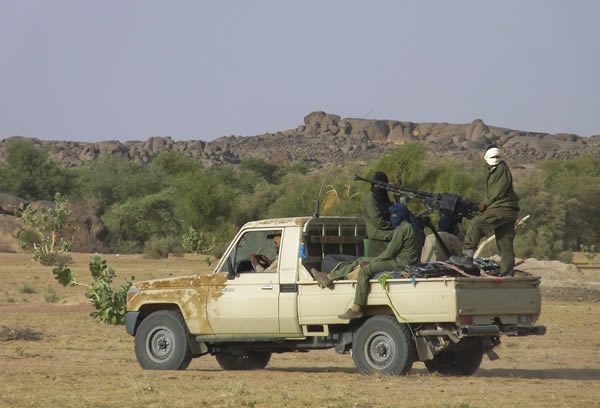As members of the Economic Community of West African States and the African Union scramble to find a solution to the crisis in Mali, Islamist forces in the north are being strengthened by foreign fighters.
Though the occupation of territory by external entities will undoubtedly strengthen the hand of Mali’s militants in terms of resources and manpower, it is also likely to stir resentment among the local population.
Last month, large groups of foreign fighters reportedly arrived in the northern towns of Gao and Timbuktu. Foreign fighters affiliated with the Movement for Unity and Jihad in West Africa (MUJAO) and al-Qaeda in the Islamic Maghreb (AQIM) are coming from Western Sahara, Algeria, Pakistan, Egypt, Yemen, Nigeria, and Sudan to help secure the Islamist foothold.
Unlike Ansar Dine, a Malian-based Islamist group, MUJAO and AQIM membership is mostly comprised of foreigners with some Malian participation. AQIM was originally created by the unification of regional Islamist groups in 2006. Infamous for its criminal activity—including kidnappings (earning $120 million in ransoms in the past decade) and smuggling everything from cocaine to Toyota trucks—AQIM could not have achieved wealth and prominence in the region without government complicity and/or local and tribal participation.
For example, unemployed youths in northern Mali are often hired as drivers and guides for traffickers. These jobs tend to pay better than licit employment. Furthermore, AQIM and its affiliates often provide services that the government (mainly the central government in Bamako) does not, including employment and clean drinking water.
However, when Ansar Dine and its regional affiliates solidified their grip on northern Mali last spring, they quickly implemented Sharia law, upsetting the way of life for many locals. Many in northern Mali—particularly the Tuareg community, which accounts nearly a third of the population—practice a moderate form of Islam and do not identify with their country’s fundamentalist occupiers. Brutal punishments—including public floggings, amputations, and stonings—have taken place, and in July, some of the Sahel’s most prized cultural sites in the administrative region of Timbuktu were ransacked for their adherence to Sufi tradition.
Knowing that such measures could turn the local population against the Islamist occupiers, AQIM’s Algerian leader, Abdelmalek Droukdel, cautioned his fighters to act in a supporting role to Ansar Dine, “gradually” implanting Sharia law rather than “impos[ing] all of the rules of Islam at once.” Nevertheless, many locals want no part of it. Northern Malian militias are growing impatient with the slow response by the interim government in Bamako and are already preparing for an offensive against the Islamists. Recruits, however, lack the training and professionalism of a military force, not to mention the weapons.
Though some local populations in northern Mali enjoy the security that the Islamist occupation provides, they are also growing increasingly resentful of their foreign occupiers. Exploitation of this resentment by local leaders could be a key factor in reducing the Islamist presence.
Adam Gianella is currently a member of the Young Leaders Program at The Heritage Foundation. For more information on interning at Heritage, please visit http://www.heritage.org/about/departments/ylp.cfm.
